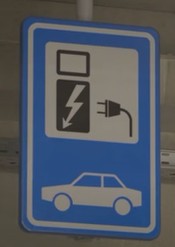Our economic and political system is all about acquiring stuff: without consumption of goods [and services] the economy wouldn't grow; and economic growth is the headline statistic summarizing how a society is doing. Crazy stuff happens: every household in our valley owns a cordless drill. The average lifetime usage of such a gadget is 20 minutes. How much better the planet would be if those 50 households stored a log-splitter, a cordless, a cement-mixer, and a bit of scaffolding in a shed in our midst?
Cars are the same in this sense: unless you are a rep for big pharma, the district nurse or a courier; your vehicle spends 95% of its life stationary at home or in the works' car-park. I chose to have a 90 minute round trip commute making idle time [1.5 ÷ 24 hrs = 96%] but I did less driving on Sat+Sun. There's no way round that if your car guzzles gas [even as little gas as my Yaris]. But if we are going to be moved - kicking and screaming - into a world of electric vehicles then the idle car can be come an asset . . . but only if we can think out side the personal toy mentality of my car.
Utrecht is a city for which I have a lot of affection: we lived there for a while in the 1970s when I was working in Blijdorp Zoo in Rotterdam. The centre was small but perfectly formed round a big church and a market surrounded by a canal where the old cellars and warehouses had been converted to cafés and flower-shops. Utrecht also has a University and has become a bit of a tech and business hub because it's more gezellig and family-friendly than Amsterdam or Rotterdam. It is throwing shapes to be the City of the Future.
My pals at Metafilter flagged a real eye-opening short aspirational film about integrating domestic, commercial and transport electrical energy in Utrecht so that they draw very little from the NL national grid and each sector supports the others to make best use out of car batteries. Because Lithium car batteries have massive capacity for storing electrical energy. Efficient energy storage is vital for any economic planning because renewable energy and human energy consumption both fluctuate wildly through the day, through the week and through the year.- Everyone puts the kettle on during the commercial breaks in the Eurovision
- Solar panels don't work at night . . . or in Mayo
- Days are much long during Summer
- Wind comes in storms . . . or it's flat calm.

No comments:
Post a Comment